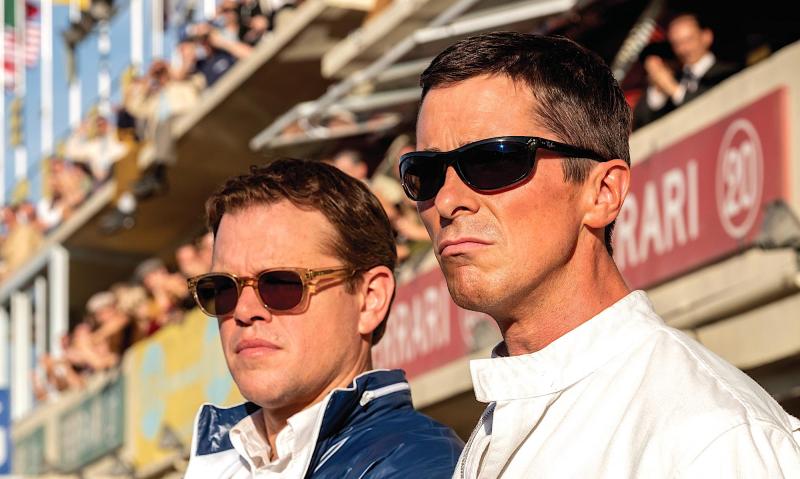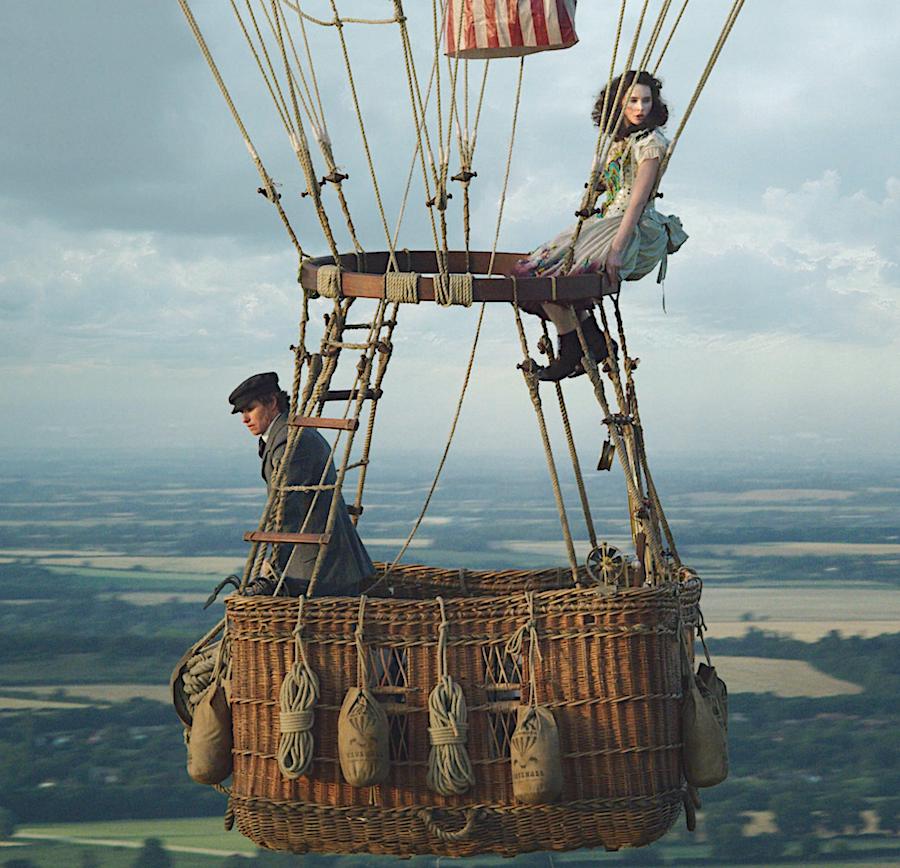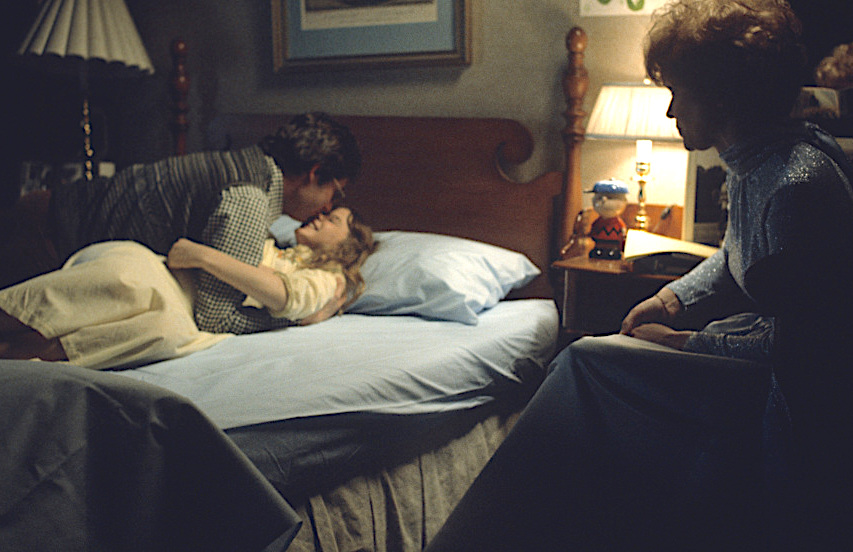LFF 2019: Le Mans '66 review - Matt Damon, Christian Bale and the Ford Motor Company go to war | reviews, news & interviews
LFF 2019: Le Mans '66 review - Matt Damon, Christian Bale and the Ford Motor Company go to war
LFF 2019: Le Mans '66 review - Matt Damon, Christian Bale and the Ford Motor Company go to war
Battle of the race aces, plus 'The Aeronauts', 'Greed' and 'The Exorcist' revisited

While recent motor racing movies have been built around superstar names like Ayrton Senna and James Hunt, the protagonists of Le Mans ’66 (shown at London Film Festival) will be barely recognisable to a wider audience. They are Carroll Shelby, the former American racing driver turned car designer, and Ken Miles, a British driver transplanted to American sports car racing.
In James Mangold’s film (with a screenplay by Jez and John-Henry Butterworth and Jason Keller), Matt Damon plays the laser-focused Shelby, while Christian Bale inhabits the stubborn Brummie mind of Miles. A former World War Two tank commander, Miles was a supremely fast driver with a gift for teasing the best out of his machinery. He didn’t do tact or small talk, though his emotional side gets an airing in scenes with wife Mollie (Caitriona Balfe) and son Peter (Noah Jupe).
Entertaining as the argumentative duo are, the story’s real struggle is between them and Ford. The company tried to buy track success by a takeover of Ferrari, only to be contemptuously knocked back as Enzo Ferrari leveraged the Ford offer to squeeze a better deal out of Fiat. The affronted Henry Ford II (a bullishly presidential performance by Tracy Letts) decreed that his company would create their own sports car programme. “This isn’t the first time the Ford Motor Company has gone to war in Europe,” he growls.
The road to Le Mans is long and arduous – as indeed is the movie, at 152 minutes – with Ford trying to sack Miles because he’s “not a Ford type of person”. Shelby won’t hear of it, and gradually what would become the world-beating Ford GT40 is honed to perfection. Frequently hampered by Ford’s absurd internal politics, as assorted executives (especially Josh Lucas’s slimy Leo Beebe) jockey for advantage, the car still whups the opposition at Daytona before tackling the Italians at Le Mans, amid the reek of motor oil, burnt rubber and the tang of rural France. We’ve seen compelling racing sequences before, but Mangold has captured a dynamic, ground-level gutsiness which lets you feel every bump jarring your tailbone. It’s half an hour too long, though.
 The Aeronauts
The Aeronauts
The Aeronauts is based on the true story of balloonists James Glaisher and Henry Coxwell, who created a world altitude record in 1862, but only Glaisher survives in Tom Harper’s film. While he’s played with the wide-eyed guilenessness we’ve come to expect from Eddie Redmayne, instead of Coxwell there’s Amelia Wren, a seasoned balloonist scarred by the death of her husband Pierre during an earlier attempt on the altitude record. Casting Felicity Jones as Wren reprises the crowd-pleasing Jones-Redmayne partnership from The Theory of Everything.
Jones was a smart choice in other ways, because her tough, resourceful character makes a sharp contrast with the fusty all-male world of starched collars and top hats in which the aeronauts’ adventures are based. Glaisher is a meteorologist certain that science can be harnessed to create the then non-existent métier of weather forecasting, and he appeals to the learned gentlemen of the Royal Society to fund a balloon expedition “for the advancement of knowledge for the good of us all”. He also wants to pay a kind of tribute to his father (Tom Courtenay), an astronomer now suffering from dementia.
It’s a simple setup and you’re left with the uneasy feeling that chunks of the story have somehow gone missing, but there’s room for Anne Reid as Glaisher’s mother, while Phoebe Fox plays Amelia’s concerned sister Antonia. The duo’s flight is distinguished by some ravishing widescreen photography of clouds, storms and landscapes, as well as a whimsical high-altitude encounter with a stream of yellow butterflies. Amelia, who’s already done a rousing music-hall turn to wow the punters as the balloon lifts off, demonstrates nerves (and fingernails) of steel as she has to make emergency repairs to the canopy as the balloon sails towards the stratosphere. File under “entertaining and family-friendly”. ★★★
 Greed
Greed
In which director Michael Winterbottom reunites with Steve Coogan (pictured right) in a caustic and often hilarious satire targeted at exploitative businessmen and dim, avaricious celebrities. Coogan plays fashion tycoon Richard McCreadie, alias Greedy McCreadie. Presumably Winterbottom’s lawyers have been all over this, because nobody can fail to mistake McCreadie for disgraced billionaire Sir Philip Green.
We’re in Mykonos, where Sir Greedy is staging a lavish Ancient Rome-themed party to celebrate his 60th birthday. As Bulgarian workers build a shoddy, fake Coliseum and Clarence the tame lion waits drowsily to re-enact scenes from Gladiator, McCreadie haggles over the prices of guest superstars (Sir Elton or Robbie Williams for £1m, Tom Jones for £350k), as he has always haggled over everything. Flashbacks to his supercilious youth find him hustling bargain-basement prices from Sri Lankan garment manufacturers and even tuk-tuk drivers, while his list of failed enterprises on the British high street offers such names as Xcellent, Impresse and Eclipse, the very acme of tawdriness. The quality of Sir Greedy’s goods is about equal to the torrent of obscenities which constitutes his everyday speech, and Winterbottom supplies a useful how-to guide on asset-stripping.
It’s disturbing how comfortable Coogan looks within this repulsive creation (his set of oversized brilliant white teeth is a masterly touch), as almost everyone is hosed with righteous disgust, from McCreadie’s ridiculous daughter in her reality TV show to David Mitchell as McCreadie’s grovelling biographer. Assorted celebs including Chris Martin and Colin Firth do little birthday pop-ups, which they might regret in hindsight. The satirical tone suddenly veers into high seriousness when the end credits bristle with captions decrying the fashion industry’s exploitation of Asian workers and deploring celebs who endorse high-end fashion brands. Here, Winterbottom and his cast come perilously close to devouring themselves. ★★★
 Leap of Faith: William Friedkin on ‘The Exorcist’
Leap of Faith: William Friedkin on ‘The Exorcist’
Swiss director Alexandre O Philippe has carved his own niche as a documentarist of cinema, having burrowed into such topics as the Psycho shower scene or the genesis of Alien. Here, he takes 84-year-old director William Friedkin on a discursive tour of the making of The Exorcist, his 1973 horror landmark (pictured left).
It's constructed around a long and fascinating interview with Friedkin, displaying polymathic knowledge as he digresses into the various influences which fed into his work, from the art of Rembrandt, Magritte and Caravaggio to the music of Ravel and Debussy. At the same time, there’s an old-school robustness about him, as he describes how he wrangled and bullied The Exorcist to completion. “I’m a one-take guy, I don’t do take two,” he declares.
If the movie’s effects look cheesy now, Friedkin approached the project with high seriousness. He’s still troubled by the ending, he confesses, and whether Father Karras deliberately committed the sin of suicide. Happily for his troubled soul, he’s able to find solace in the Zen garden at Kyoto.
But it’s likely that he’s enjoying spinning us a web of tantalising fictions. He could be entirely unsentimental, as potential soundtrack composers discovered. Bernard Herrmann proposed to use the church organ at St Giles, Cripplegate, so Friedkin sacked him. Lalo Schifrin wrote a score that the director considered intrusive and too loud, and their friendship ended there and then. To get real-life priest William O’Malley to perform on camera, Friedkin blindsided him with a slap in the face. You didn’t want to mess with Bill. ★★★
The future of Arts Journalism
You can stop theartsdesk.com closing!
We urgently need financing to survive. Our fundraising drive has thus far raised £49,000 but we need to reach £100,000 or we will be forced to close. Please contribute here: https://gofund.me/c3f6033d
And if you can forward this information to anyone who might assist, we’d be grateful.

Subscribe to theartsdesk.com
Thank you for continuing to read our work on theartsdesk.com. For unlimited access to every article in its entirety, including our archive of more than 15,000 pieces, we're asking for £5 per month or £40 per year. We feel it's a very good deal, and hope you do too.
To take a subscription now simply click here.
And if you're looking for that extra gift for a friend or family member, why not treat them to a theartsdesk.com gift subscription?
more Film
 Oslo Stories Trilogy: Dreams review - love lessons
First love's bliss begins a utopian city symphony
Oslo Stories Trilogy: Dreams review - love lessons
First love's bliss begins a utopian city symphony
 theartsdesk Q&A: filmmaker Dag Johan Haugerud on sex, love, and confusion in the modern world
The writer-director discusses first-love agony and ecstasy in 'Dreams', the opening UK installment of his 'Oslo Stories' trilogy
theartsdesk Q&A: filmmaker Dag Johan Haugerud on sex, love, and confusion in the modern world
The writer-director discusses first-love agony and ecstasy in 'Dreams', the opening UK installment of his 'Oslo Stories' trilogy
 Blu-ray: Two Way Stretch / Heavens Above
'Peak Sellers': two gems from a great comic actor in his prime
Blu-ray: Two Way Stretch / Heavens Above
'Peak Sellers': two gems from a great comic actor in his prime
 Late Shift review - life and death in an understaffed Swiss hospital
Petra Volpe directs Leonie Benesch in a compelling medical drama
Late Shift review - life and death in an understaffed Swiss hospital
Petra Volpe directs Leonie Benesch in a compelling medical drama
 The Naked Gun review - farce, slapstick and crass stupidity
Pamela Anderson and Liam Neeson put a retro spin on the Police Squad files
The Naked Gun review - farce, slapstick and crass stupidity
Pamela Anderson and Liam Neeson put a retro spin on the Police Squad files
 theartsdesk Q&A: actor Lars Eidinger on 'Dying' and loving the second half of life
The German star talks about playing the director's alter ego in a tormented family drama
theartsdesk Q&A: actor Lars Eidinger on 'Dying' and loving the second half of life
The German star talks about playing the director's alter ego in a tormented family drama
 The Fantastic Four: First Steps review - innocence regained
Marvel's original super-group return to fun, idealistic first principles
The Fantastic Four: First Steps review - innocence regained
Marvel's original super-group return to fun, idealistic first principles
 Dying review - they fuck you up, your mum and dad
Family dysfunction is at the heart of a quietly mesmerising German drama
Dying review - they fuck you up, your mum and dad
Family dysfunction is at the heart of a quietly mesmerising German drama
 theartsdesk Q&A: director Athina Rachel Tsangari on her brooding new film 'Harvest'
The Greek filmmaker talks about adapting Jim Crace's novel and putting the mercurial Caleb Landry Jones centre stage
theartsdesk Q&A: director Athina Rachel Tsangari on her brooding new film 'Harvest'
The Greek filmmaker talks about adapting Jim Crace's novel and putting the mercurial Caleb Landry Jones centre stage
 Blu-ray: The Rebel / The Punch and Judy Man
Tony Hancock's two film outings, newly remastered
Blu-ray: The Rebel / The Punch and Judy Man
Tony Hancock's two film outings, newly remastered
 The Ballad of Suzanne Césaire review - a mysterious silence
A black Caribbean Surrealist rebel obliquely remembered
The Ballad of Suzanne Césaire review - a mysterious silence
A black Caribbean Surrealist rebel obliquely remembered
 Harvest review - blood, barley and adaptation
An incandescent novel struggles to light up the screen
Harvest review - blood, barley and adaptation
An incandescent novel struggles to light up the screen

Add comment